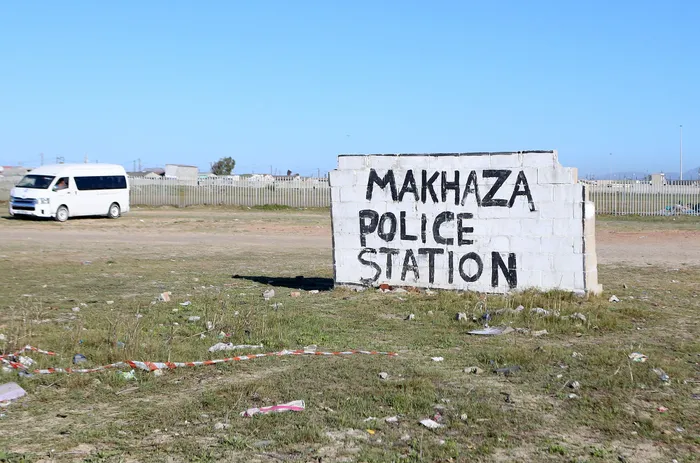Fight to get better policing resources for Cape townships heads to ConCourt

A wall that has the words "Makhaza Police Station" written on it is at the location where a police station was supposed to be built. Picture: Brendan Magaar/African News Agency (ANA)
Cape Town - Communities in Khayelitsha, surrounding townships and informal settlements are keenly watching a Constitutional Court hearing to force the police minister to allocate resources to their communities.
The case has been brought by the Social Justice Coalition (SJC) and others.
The SJC, through its legal representative, the Legal Resources Centre (LRC), is seeking leave to appeal against what it says is the Equality Court’s constructive refusal to grant a remedy for the unfair discrimination, concerning inadequate allocation of policing resources to townships and informal settlements.
As an alternative, SJC, Equal Education, and the Nyanga Policing Forum, are seeking direct access to the Constitutional Court to determine the outstanding issues in the 2016 Equality Court application, or for the limited purpose of issuing directions to the Equality Court regarding the finalisation of the proceedings before it.
In August 2012, social organisations led by the SJC campaigned for the provincial government to establish the Khayelitsha Commission of Inquiry.
A report was released two years later. It made 20 recommendations for implementation which included upgrading of the physical infrastructure of the Khayelitsha police stations and the establishment of the new Makhaza police station.
It also recommended that the allocation of human resources be revised and more human resources be reallocated urgently to Khayelitsha’s three police stations.
The SJC said following its failure to engage the police on the commission’s recommendations, in 2016, the coalition, the Nyanga Community Policing Forum and Equal Education launched an application in the Equality Court to challenge the allocation of police resources in terms of the Promotion of Equality and Prevention of Unfair Discrimination Act 4 of 2000 (Equality Act).
In 2018, the Equality Court found and declared that the allocation of police human resources in the province and the system used by the police to determine the allocation of police human resources unfairly discriminated against black and poor people based on race and poverty.
However, the hearing on what relief should be granted to remedy the unfair discrimination found in the judgment was postponed by the high court “to a date which shall be arranged with the parties”, the SJC said.
SJC researcher Thando George said after months of attempting to arrange for a hearing on an effective remedy to address the unfair discrimination, the SJC approached the Constitutional Court as a last resort.
LRC attorney Amy-Leigh Payne said since December 2014 the LRC and the State had been engaged in discussions.
“The LRC is cognisant that part of the delay was that one of the judges was acting in the Supreme Court of Appeal.
“However, it is our responsibility to uphold our clients’ rights and ensure that they receive the relief sought. Thus, it was decided to approach the Constitutional Court when no response was received from the high court,” said Payne.
Khayelitsha Development Forum leader Ndithini Thyido said almost 10 years after the commission’s recommendations none had been implemented, except for a mobile police station in Makhaza. Thyido said the forum still demanded a proper police station for Makhaza.
“We also made representations at the commission and the issue of equitable division of police resources in the Western Cape is something that the KDF is monitoring closely and demanding that it is done.
“Khayelitsha has grown dramatically, resulting in more than 20 informal settlements in the last two years,” he said.
The mobile office was an important intervention, but it was not a permanent solution Thyido said.
mthuthuzeli.ntseku@inl.co.za
Related Topics: